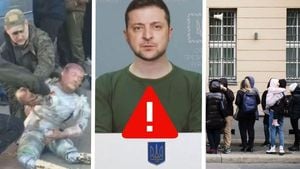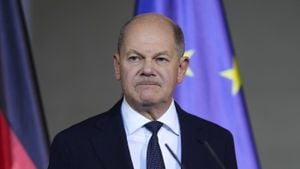On December 4, 2024, significant events unfolded across India, highlighting the political climate and societal concerns impacting various communities. With protests, police actions, and safety measures coming to the forefront, the day reflected the challenges and responses of both citizens and officials alike.
One notable incident involved Rahul Gandhi, the Leader of Opposition (LoP) in the Lok Sabha, who, along with Congress MP Priyanka Gandhi, faced police barricades as they attempted to travel to Sambhal district, Uttar Pradesh, which had been shaken by recent violence. Stopped at the Ghazipur border on the Delhi-Meerut Expressway, Gandhi chaotically expressed his frustration through social media, stating, "The police stopped us from going to Sambhal. Being the Leader of Opposition, it is my right and duty to go there. Yet, I was stopped." He questioned the motives behind the police action, implying it was politically motivated to shield the ruling BJP from scrutiny.
This incident drew criticism from various quarters, with Congress leader Gaurav Gogoi supporting Gandhi’s claim, asking, "When any political leader wants to carry a message of peace, why do they stop them?" Meanwhile, BJP leaders defended the police's decision, asserting it was necessary for maintaining order, with Union Minister Giriraj Singh accusing Gandhi of trying to stage political drama. The contrasting narratives mimicked the larger political divisions within the country, underscoring the heightened tensions as elections approach.
On another front, the Madhya Pradesh police found themselves at the center of controversy for allegedly mishandling claims of torture by Dalit youth Deepak Malviya. After Malviya shared distressing footage asserting abuse by officers at the Raigarh district police station, the police quickly responded, stating, "No such incident occurred," and asserting there are numerous CCTV cameras in place documenting police interactions. Malviya's claims stirred outrage and calls for accountability, with Congress party officials sharing the footage as evidence of systemic issues within law enforcement.
From the protestors' perspective, the use of harsh tactics against marginalized communities raises significant concerns about human rights and the treatment of Dalits; this prompted the Madhya Pradesh BJP to counter the narrative by accusing the opposition of spreading misinformation for political gain. BJP’s media chief Ashish Agarwal demanded apologies from Congress leaders, alleging attempts to create unrest within the state through sensationalized claims.
Meanwhile, the state witnessed another display of citizen frustration as large-scale protests erupted across Karnataka. Several Hindu organizations gathered under the banner of ‘Hindu Hitarakshana Vedike’ to demand governmental intervention against reported atrocities on minorities, particularly Hindus, within Bangladesh. The protests stemmed from reports of violence against minorities, with demonstrators citing over 2,000 instances of documented aggression, including fatalities.
The rising tensions were exacerbated by recent events surrounding Hindu monk Chinmoy Krishna Das, whose arrest and postponed bail hearing have fueled anger among the community. Protestors united under common cause echoed sentiments of solidarity and urged the Indian government to take action to protect minorities not just within Bangladesh, but on a global scale. Complaints about the handling of such matters by authorities emerged during speeches, with protestors referencing historical ties and sacrifices made during Bangladesh's liberation, lamenting the perceived abandonment of these communities today.
Aside from the political and civil unrest, safety measures were commendably highlighted on December 4, following a potentially disastrous incident with CNG cylinders leaking from a truck traveling through Saran district, Bihar. Truck driver Raju Ansari noticed the leak as he drove near the Mehiya Over Bridge, prompting him to halt the vehicle immediately. The ensuing chaos among locals was palpable as they feared the danger of explosion due to nearby ignition sources. Quick-thinking traffic police and nearby residents sprang to action, effectively evacuining the area and neutralizing the threat.
Local authorities praised the collaborative efforts taken to handle the situation, describing it as timely and coordinated. Vishal Anand, the officer at Mufassil Police Station, emphasized the importance of community involvement, stating, "Suddenly gas started leaking. With the help of traffic police and local people, the accident was averted." The incident serves as ample evidence of how immediate community responses can prevent disaster, reinforcing the need for collective vigilance.
The day’s events encapsulated the multifaceted societal dynamics at play, where political rivalry, community rights, and public safety remain at the forefront of national discourse. Such incidents reflect the need for responsible governance and active citizen engagement, showing the strength of community response and the importance of staying informed about local and national issues.
Finally, the Gurugram police reported on the successful bust of a fake call center targeting US nationals under the pretense of providing technical support. During the raid, authorities arrested three individuals operating from illegal premises, attempting to defraud unsuspecting consumers through e-gift card schemes. Police noted the call center had engaged with numerous victims under false pretenses since its inception back in August.
Priyanshu Diwan from the cybercrime police indicated the operations wouldn't stop there, stating, "The matter is under investigation. The involvement of other people cannot be ruled out." The authorities’ swift action demonstrates their commitment to combatting cybercrime, signifying the urgent need to address and mitigate the risks posed by fraudulent schemes.
Through these events, December 4, 2024, served not only as reflection of the tense political and social climate of India but also as reminders of community vigilance, the struggle against injustice, and the importance of safety protocols and regulations. These stories weave together the fabric of contemporary India, showcasing its challenges and triumphs through adversity, urging both citizens and leaders to advocate for truth, safety, and integrity.



